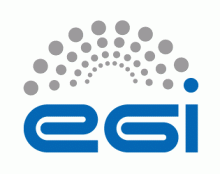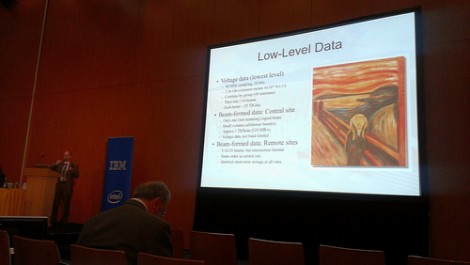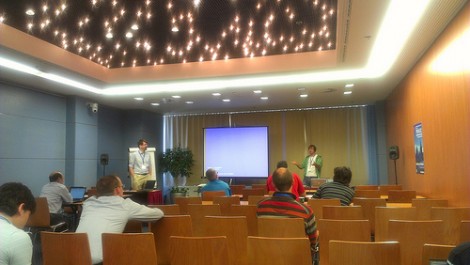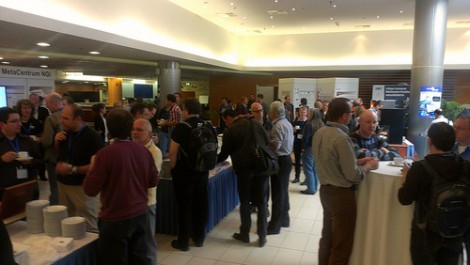|
Digital meets Culture https://www.digitalmeetsculture.net/article/how-egi-is-supporting-digital-cultural-heritage/ Export date: Wed Feb 11 20:08:19 2026 / +0000 GMT |
How EGI is supporting digital cultural heritageby Steve Brewer, EGI
The EuroMed 2012 conference is a large event that brings together a wide range of experts from across the field of DCH coving both interdisciplinary and multi-disciplinary research on both tangible and intangible Cultural Heritage. Of particular interest is the use of cutting edge technologies for the protection, preservation, conservation, large-scale digitalisation as well as the visualization and presentation of the Cultural Heritage content. The scope of the event covers both practitioners and policy makers which should contribute to the awareness-raising aspect of the event as well as the future direction of activity. The rapid shift in working practices within DCH has occurred as a result of many independent initiatives. EGI.eu is committed to reaching out the DCH community by promoting the benefits of the Infrastructure as well as helping to tailor services to this community's particular needs. The European Grid Infrastructure (EGI) is a federation of computing resource providers set up to support collaborative and innovative research projects from all fields of science. EGI supports over 20,000 researchers from 15 different disciplines in their intensive data analysis. Expanding the user base, in both absolute numbers and diversity is a key priority for the sustainable future of the e-Infrastructure. EGI is therefore keen to engage with researchers working in the humanities, a community that is currently under-represented in the EGI ecosystem. In addition to coordinating access to the computing resources and data storage provided by the EGI community through open source software solutions, international scientific communities can draw many benefits from a strong partnership with EGI. Benefits that include an open process to improve its user community oriented services, workshops and forums to collect and refine community input, help and support on resolving specific technical issues, as well as involvement in the evolution of EGI's production infrastructure. The prime scope of this collaboration with the Humanities in general and DCH in particular is to research, construct and operate services for the arts and humanities. Key areas of collaboration include: long-term data storage and availability, the curation of datasets, hosting and monitoring of middleware services, and authentication and authorisation services. In addition to on-going interaction with the DARIAH, CLARIN, DASISH projects, EGI is a partner in the DCH-RP project which will deliver a Roadmap for Preservation for the DCH community. EGI.eu is leading the running of Proofs of Concept tests which will demonstrate the progress and opportunities in this area and will bring together resources from the NRENs and the commercial sector as well as EGI and the traditional DCH sector. Work to date in the Cultural Heritage sector by EGI has included the ASTRA project led by DANTE using EGI resources which has been able to recreate the sound and feel of old musical instruments, such as the barbiton, or the epigonion last heard in Ancient Greece. The research is multidisciplinary and uses archeological remnants and document analysis as a base to reconstruct the sounds of the instruments via physical modelling techniques. The method is very useful to resurrect old acoustics, but it is also computing intensive since the complex models of the musical instruments are solved by integrating differential equations numerically. By using grid computing, the ASTRA team was able to run digital signal processing algorithms in reduced times. EGI is tracking trends in the field of Cultural Heritage research as far as possible in order to identify opportunities where integration and support for the infrastructure that supports researchers in this field can be addressed. Many of these e-Heritage initiatives cover the Asia-Pacific region including China and Australia. Google, too, has made an impact with its bold move to digitise many of the world's texts under the Google Books Library Project. EGI provides significant added value to multi-disciplinary, collaborative research in Europe through its e-Infrastructure and services. This ensures that researchers have access to uniform and reliable computing resources, enabling faster scientific results and avenues of multi-disciplinary research otherwise not possible and guarantees an integrated, reliable and uniform service provided across organisational and national boundaries thanks to the monitoring and operational services. Official website: www.egi.eu |
 EGI.eu, the not-for-profit organization that manages the European Grid Infrastructure is participating in EuroMed 2012 in Limassol, Cyprus in order to bolster its involvement in the Cultural Heritage research community as well as glean further insight into future directions in this dynamic and fast expanding field. The rapidly growing collections of digital cultural resources and the associated research have rapidly transformed this field into a data-based science. It is therefore appropriate that an e-Infrastructure explores what offerings there are that meet the requirements of cultural heritage researchers. In order to make progress with this objective, EGI must work with the key players from the Ministries of Culture and cultural institutions such as museums, libraries and archives to learn more of their needs whilst at the same time understanding the big picture for ICT in Cultural Heritage research including the broader European Union perspective.
EGI.eu, the not-for-profit organization that manages the European Grid Infrastructure is participating in EuroMed 2012 in Limassol, Cyprus in order to bolster its involvement in the Cultural Heritage research community as well as glean further insight into future directions in this dynamic and fast expanding field. The rapidly growing collections of digital cultural resources and the associated research have rapidly transformed this field into a data-based science. It is therefore appropriate that an e-Infrastructure explores what offerings there are that meet the requirements of cultural heritage researchers. In order to make progress with this objective, EGI must work with the key players from the Ministries of Culture and cultural institutions such as museums, libraries and archives to learn more of their needs whilst at the same time understanding the big picture for ICT in Cultural Heritage research including the broader European Union perspective.

